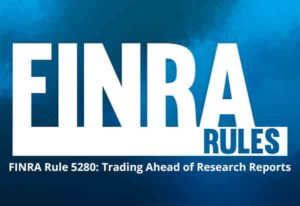 Generally speaking, investments advisers are in the role of trying to predict what positions will go up and what will go down. While there are certainly many different factors that go into making predictions and recommendations, there is no doubt that conducting and analyzing research reports is a big part of the job.
Generally speaking, investments advisers are in the role of trying to predict what positions will go up and what will go down. While there are certainly many different factors that go into making predictions and recommendations, there is no doubt that conducting and analyzing research reports is a big part of the job.
Most investment firms employ researchers to conduct reports to determine where money should go. Of course, many brokers control two different categories of money: Their own money and their clients’ money. When this is the case, these two departments at the firm must be reasonably separated; otherwise, the firm could easily manipulate the market for its own benefit.
How the Unlawful Practice of Trading Ahead of Research Reports Can Hurt Customers
Imagine that a brokerage firm has several hundred clients. Over the last two months, several of the top research analysts at the firm were putting together an extensive report on an technology stock. Tomorrow at noon, the report is going out to all of the clients and it will recommend that they all purchase a significant amount of that tech stock. Based on the positive content and timing of the release, these researchers can be fairly confident that this stock will be going up tomorrow.
As such, they inform their co-workers in the trading department to buy the stock tonight. This will benefit the firm greatly when the price goes up tomorrow. Of course, it will also raise the price of the stock and it hurts all of the firm’s clients. This is a direct violation of FINRA rule 5280. This rule strictly prohibits firms from trading ahead of research reports.
When brokers do so, they are repositioning their assets based on the knowledge of non-public information at the direct expense of their own customers.
Trading Ahead of Research Reports is a Major Problem
Rule 5280 puts an affirmative duty on firms to put proper safeguards in place to protect client centered research knowledge from getting to their own trading department. Firms must restrict access to information regarding both the timing of the reports and the content of these reports. The lack of safeguards has been a big problem over the last several years and investors have been financially damaged as a result.
For example, in 2012, Goldman Sachs agreed to pay a $22 million fine to settle charges with the SEC that stemmed from the casual intermingling of their research department and their trading department. As was reported in the New York Times, employees at the investment giant used informal ‘trading huddles’ as a way to pass on insider tips from the client research department to preferred trading clients as well as their own trading department.
According to the SEC, Goldman’s lack of proper safeguards created an environment where insider research information could be shared and used within the firm prior to that information being published publicly.
Contact Our Office Today
At the Sonn Law Group, we dedicate our entire legal practice to protecting the legal rights and financial interests of investors. Our securities fraud attorneys have spent nearly thirty years fighting for investors. To learn more about how we can help you, please get in touch with our team today by calling 1-844-689-5754. Initial legal consultations are always free of charge.
CONTACT US FOR A FREE CONSULTATION
Se Habla Español
Contact our office today to discuss your case. You can reach us by phone at 844-689-5754 or via e-mail. To send us an e-mail, simply complete and submit the online form below.

